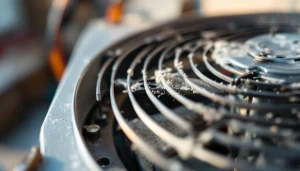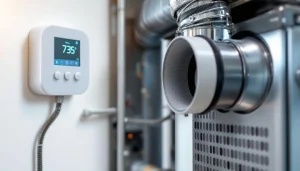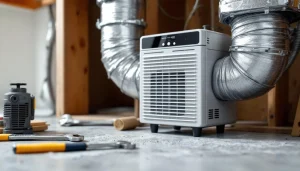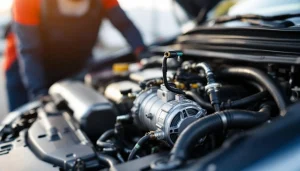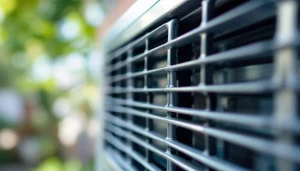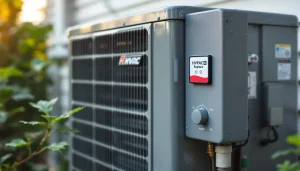Finding the most efficient way to air conditioner home can be a breeze, especially when you focus on a few key strategies:
- Set your thermostat to the highest comfortable temperature.
- Use ceiling fans to circulate air and keep it cool.
- Maintain and service your AC unit regularly.
- Improve your home’s insulation to keep the cool air in.
In the sunny climate of Palm Coast, FL, where keeping cool is more necessity than luxury, achieving energy-efficient air conditioning can make a world of difference. Not only can this approach keep your home comfortable, but it also protects your wallet from excessive cooling costs—an essential consideration for residents who are mindful of their budget. Reliable, cost-effective solutions to managing HVAC systems ensure that unexpected expenses are avoided.
Most importantly, simple steps like setting the right thermostat temperature and utilizing passive cooling elements such as blinds and fans can lead to substantial savings. This doesn’t just cut costs; it’s about creating a reliable comfort zone that feels right at home. So, let’s explore how to keep your cool without breaking the bank.

Most efficient way to air conditioner home terms at a glance:
– energy efficient air conditioning systems
– most efficient way to heat and cool a home
Most Efficient Way to Air Conditioner Home
Setting the Right Temperature
The first step to efficiently air conditioning your home is setting your thermostat to the right temperature. Aim for the highest temperature that still feels comfortable. Experts often recommend setting it to 26°C (about 78°F) during the day. This can significantly reduce your energy bill while keeping your home cool.
In fact, for every degree you raise your thermostat, you can save 5-10% on cooling costs. This means that keeping your thermostat at 78 degrees instead of a chillier setting can lead to noticeable savings over time.
Using Fans and Blinds
Ceiling fans are your best friend when it comes to circulating cool air efficiently. They help distribute air evenly, allowing you to set your thermostat a few degrees higher without sacrificing comfort. Fans cool people, not rooms, so turn them off when you leave a room to save energy.
In addition to fans, using blinds or shades can make a big difference. Closing blinds during the hottest part of the day prevents heat from entering your home. This form of passive cooling reduces the workload on your air conditioner, leading to further energy savings.
Combining these strategies—setting the right temperature and using fans and blinds—creates a comfortable environment that doesn’t drain your wallet. By focusing on these simple adjustments, you can enjoy a cooler home and a lighter energy bill.
Reducing Heat in Your Home
Reducing the amount of heat that enters your home is crucial for keeping it cool and minimizing energy use. There are several effective strategies you can implement to achieve this.
Insulation and Sealing
Proper insulation and sealing are key to maintaining a comfortable indoor temperature. Insulating your walls and ceilings can significantly reduce the amount of heat that enters your home. If you have the budget, consider upgrading your insulation to more efficient materials.
Window glazing is another powerful tool. Double or triple-glazed windows can prevent heat from sneaking in, keeping your home cooler during the summer months. Additionally, using foam and caulking to seal gaps around windows and doors can stop warm air from creeping in.
Draft stoppers are a simple yet effective solution to prevent hot air from entering under doors. By blocking these drafts, you maintain a cooler indoor environment and reduce the burden on your air conditioning system.
Rooftop solar systems not only provide shade but also generate electricity, offsetting your power usage. This dual benefit makes them an excellent investment for reducing heat and energy consumption.
Smart Use of Appliances
Efficient appliance use can also help in reducing heat. Avoid using the oven on particularly hot days, as it can add unwanted warmth to your home. Instead, opt for more efficient appliances like microwaves or slow cookers, which generate less heat.
Efficient appliances are designed to consume less energy and produce less heat. Upgrading to energy-efficient models can lead to substantial savings on both energy costs and cooling needs.
By adopting these practices, you can effectively reduce the heat in your home, making it easier to maintain a comfortable temperature without over-relying on your air conditioner. This not only saves energy but also extends the lifespan of your HVAC system.
Choosing and Maintaining Your AC Unit
Choosing the right air conditioning unit and maintaining it properly can significantly impact your home’s energy efficiency and cooling costs. Here’s how to ensure you’re getting the most out of your AC system.
Regular Maintenance Tips
Regular maintenance is crucial for keeping your air conditioner running efficiently. A well-maintained unit not only cools your home better but also uses less energy, saving you money.
-
Clean Filters: Dirty filters can obstruct airflow, making your AC work harder. Clean or replace them regularly to maintain efficiency.
-
Service Checks: Schedule regular service checks to ensure your AC is in top condition. Technicians can spot issues early, preventing costly repairs.
-
Outdoor Units: Keep outdoor units free of debris and vegetation. This ensures proper airflow and prevents damage.
-
Inverter Technology: Consider units with inverter technology. These adjust the compressor speed based on cooling needs, offering more efficient temperature control and reducing energy consumption.

When to Replace Your AC
Knowing when to replace your AC unit is key to maintaining energy efficiency. Older units tend to be less efficient and can drive up energy costs.
-
Energy Efficiency and Star Rating: When it’s time to replace your unit, look for models with a high star rating. Even a half-star increase can result in significant savings over the unit’s lifespan.
-
Incentive Schemes: Check for state government incentive schemes that can help cover the cost of upgrading to a more efficient unit. These programs can make a big difference in upfront costs.
-
Signs of Inefficiency: If your AC struggles to cool your home, makes unusual noises, or frequently needs repairs, it might be time for a replacement.
By choosing an energy-efficient unit and keeping it well-maintained, you can keep your home cool without breaking the bank. This approach not only saves money but also reduces your environmental footprint.
Frequently Asked Questions about Air Conditioning Efficiency
What is the most cost-effective way to run your air conditioner?
The most efficient way to air conditioner home is by setting your thermostat to the highest comfortable temperature. Typically, this means around 78°F (26°C) during the day. By doing this, you can save significantly on your energy bills. Each degree you raise the thermostat can save about 5-10% on cooling costs.
Modern HVAC systems with inverter technology adjust their output to maintain a consistent temperature, which is more energy-efficient than older systems that cycle on and off. So, set your thermostat wisely and let your system do the work.
Should you turn off your AC when on vacation?
When leaving for vacation, it’s tempting to turn off the AC completely to save on energy costs. However, this might not always be the best approach. If your HVAC system is off for too long, it might have to work extra hard to cool down your home upon return, especially in hot climates like Palm Coast, FL.
Instead, consider setting your thermostat a few degrees higher than usual. This keeps humidity in check and prevents your system from working overtime when you return. For extended trips, a programmable thermostat can be a great investment, allowing you to control settings remotely and ensure efficiency.
How can ceiling fans help with cooling?
Ceiling fans are a simple yet effective way to improve your cooling strategy. They don’t actually lower the room temperature but create a wind-chill effect, making the room feel cooler. This allows you to set your thermostat a few degrees higher without sacrificing comfort, leading to energy savings.
By using ceiling fans in conjunction with your air conditioning, you can improve air movement and reduce reliance on the AC unit. Remember to turn off fans when leaving a room to save energy, as they cool people, not spaces.
These strategies can help you maintain a comfortable home environment while keeping energy costs in check. Stay tuned as we dive into more tips and tricks for optimizing your cooling system.
Conclusion
As we wrap up our exploration of air conditioning efficiency, it’s clear that keeping cool without breaking the bank is achievable with the right strategies. At Klein Cooling, we’re committed to helping you achieve just that with our expert HVAC services in Palm Coast, FL.
Our family-owned business prides itself on delivering honesty, integrity, and exceptional service. Whether it’s installation, repair, or maintenance, we ensure your HVAC system operates at peak efficiency. Our services aren’t just about fixing problems—they’re about building long-term relationships with our customers and ensuring their comfort year-round.
Regular maintenance is key to keeping your system efficient. Simple actions like cleaning filters and ensuring outdoor units are clear of debris can make a significant difference. If you’re considering an upgrade, look for energy-efficient units with a high star rating. Not only do they save energy, but they also often qualify for incentive schemes that can help offset costs.
For those in Palm Coast, FL, Klein Cooling offers custom HVAC solutions that combine family values with professional expertise. We even offer discounts for first responders, military personnel, and seniors, because we believe everyone deserves comfort without compromise.
For more information about our services or to schedule maintenance, visit our Additional Services page. We’re here to help you keep your cool, efficiently and affordably.

